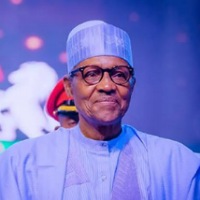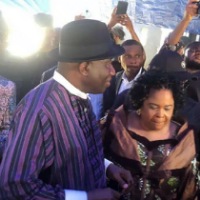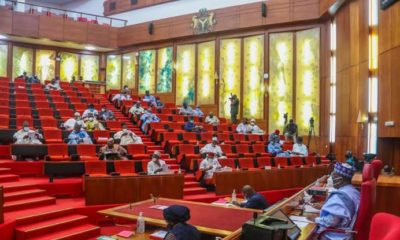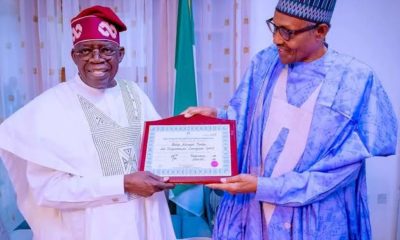Finance
President Buhari begins total probe of Jonathan’s govt
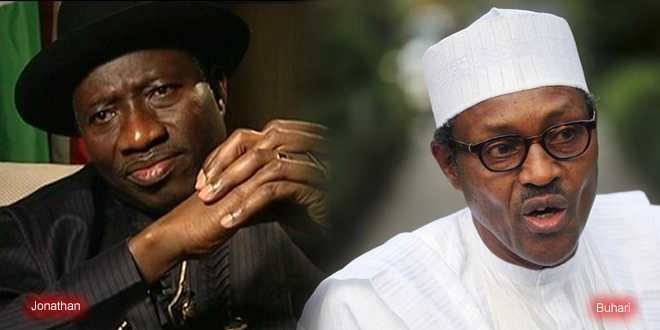
ABUJA — A total probe of the administration run by immediate past president, Dr Goodluck Ebele Jonathan is underway as the National Economic Council, NEC, Ad-hoc Committee on the Management of Excess Crude Account Proceeds and Accruals into the Federation Account, headed by the Governor of Edo State, Mr. Adams Oshiomhole, is to hire two international forensic audit firms to probe revenue that accrued into the Federation Account and how it was spent under former Dr Goodluck Jonathan as President.
Mr. Oshiomhole told journalists at the end of the first meeting of the committee in Abuja, yesterday that the auditors would cover the period January 1, 2010 to June 1, 2015.
It put paid to calls by the opposition Peoples’ Democratic Party, PDP, that Buhari should extend his probe to the administrations of Jonathan’s predecessors, Alh. Umaru Yar’ Adua.and Chief Olusegun Obasanjo.
Already, some revenue generating agencies have been invited to brief the committee which will take detailed briefings from all Ministries, Departments and Agencies, MDAs of the Federal Government that deal directly with revenue.
The focus will be on the Nigerian National Petroleum Corporation, NNPC, the Nigeria Customs Service, the Central bank of Nigeria, the Nigeria Extractive Industries Transparency Initiative, NEITI, among others.
Other members of the committee included Gov. Nasir Ahmed El-Rufai of Kaduna State, Ibrahim Dankwambo of Gombe, and Udom Emmanuel of Akwa Ibom.
He said that the committee did not want its actions to be bogged down by political interpretations and that the members were not professionals. Even if they were professionals, he said that their duties as governors would not allow them the time to do a thorough work.
His words, “We held our first primary session today here with some of the revenue generating agencies that are supposed to remit funds to the federation account. We had a successful session with Customs, NPA, NEITI, SEC, FIRS, and quite a number of others and next week we will also hear from CBN, Ministry of Finance, Office of the Accountant-General of the Federation.
For the remaining ones, we agree we are going to meet on Thursday next week, NNPC, NPDC, DPR, NIMASA and other remaining agencies.
We have started the work, with the idea to hear them out, what they have been doing, with particular emphasis on revenue accruing from these organizations and whether or not these have been remitted to the Federation Account for judicious distribution.
His words: “We realised that this is a task and given our mandate, even if we were professional accountants because we are sitting governors, we would not have the time to do a forensic audit which this assignment entails.
“Therefore, we have agreed in line with our mandate to appoint two reputable international audit firms to carry out a thorough forensic audit, not only of NNPC, which is more of excess crude, but other monies that accrued to the Federation Accounts. We have other revenues like bonuses, royalties, taxes, VAT that flow into the Federation Account.
“We are taking a holistic review of the entire process, looking at all the agencies that make contribution of funds to the federation account.
We are convinced that by appointing audit firms, we will allow professionals to carry out this exercise, so that it will be free of any political colouration and also we will ensure the outcome of the investigation will.
“We have learned, we have listened and asked questions. I think we all have a clear picture of what is happening in those organizations before now. Some have information to supply and we have drawn attention to those areas, they are willing to oblige. We believe in the end, we will be able to not just establish what had happened over the period but much more important, going forward with the changes the President has promised the country.
“It is not going to be business as usual. He started on a clean slate and everybody knows the new rules of the game and in particular as the laws apply to the various institutions are implemented in full. So I think we started very well. We are very confident that we are going to come out with something that is going to be of immense benefits to the Nigerian people”.
On the rationale for embarking on another audit report with regards to the alleged missing funds, he said “Some reports were produced by PWC but in that report the PWC expressed their frustration and pointed to the fact that they were not able to access all the information they needed and that what they were able to produce was to the extent of information that was made available to them.”
He added: “Audit can only be credible as much as information that was made available to auditors. The good news now is that with President Buhari, all the books will be open, no agency has any protection. Any agency that refuses to open the books then is ready to go on confrontation with the authority.
“The forensic audit will act on the whole truth and nothing but the truth so that all stakeholders will have basis to formulate good policies and that Nigeria will never find itself in this circle where huge sums of money are allegedly diverted and unaccounted for. Audit has become a way of life for all public institutions.”
On the duration of the audit exercise, Oshiomhole explained that the committee had looked at it professionally. “We are focusing on a five year circle. What we have agreed is that we are going to carry out an audit for five years from 1st January 2010 to 30th June 2015.
“If the audit report reveals that we need to go backward, then we can do that. But for the first instance, this is the period that we consider good.
“We can’t impose a time frame on them but will engage them and by Thursday we will be able to make it public. We need to listen to them and agreed with them on how much time will be okay for them. We are all in a hurry to ensure that the right thing is done. The emphasis is not on time but doing thorough job.
“By next week we will meet with the big ones and we will then be able to tell you the audit firms that we have appointed. They are firms I am sure Nigerians will have confidence in.
“At the end of the audit we will hear them out and reconcile them with what the laws says and arrive at a position. Given the volume of work and complicated nature of issues, we agreed we need professionals to carry out the audit. It is only the professionals that can handle it. It is not good to compromise”.
Vanguard-
Banking
CBN Denies Currency Devaluation

The Central Bank of Nigeria (CBN) has refuted claims of devaluing the.
Earlier reports suggested that the CBN had devalued the Naira, lowering its exchange rate from N631 to the dollar, compared to the previous day’s rate of N461.60 at the Importers and Exporters (I&E) window.
However, the Central Bank of Nigeria (CBN) released a statement on Thursday through its Acting Head of Corporate Communications, Dr. Isa Abdulmumin, categorizing the report as false information.
In the statement titled ‘CBN Has Not Devalued The Naira’, he said the attention of the apex bank was drawn to the news report by an Abuja based newspaper edition of June 1, 2023, titled “CB Devalues Naira To 630/51”.
However, the CBN stated categorically that the news report was replete with outright FALSEHOODS and destabilizing innuendos, ‘reflecting potentially willful ignorance of the said medium as to the workings of the Nigerian Foreign Exchange Market.’
“For the avoidance of doubt, the exchange rate at the Investors’ & Exporters (I&E) window traded this morning (June 1, 2023) at N465/USS1 and has been stable around this rate for a while.
“The public is hereby advised to ignore the news report by Daily Trust in its entirety, as it is speculative and calculated at causing panic in the market,” the CBN spokesman added.
He, therefore, advised media practitioners to verify their facts from the Central Bank of Nigeria before publishing in order not to misinform the public.
Banking
BREAKING: CBN Increases Interest Rate By 0.5%

The interest rate in Nigeria has been raised to 18.5 percent, up by 0.5 percent, from 18 percent where it was pegged in March 2023.
The Central Banks of Nigeria’s (CBN) Monetary Policy Committee (MPC) resolved to this effect at its third meeting of 2023 in Abuja, on Wednesday.
Governor, CBN, Godwin Emefiele, made the disclosure in the communiqué of the MPC’s meeting, thereafter.
While engaging the media at the end of the two-day meeting, Emefiele, said the committee voted to keep the asymmetric corridor at +100 and -700 basis points around the MPR.
In the view of the MPC, rising inflation rate is traceable to the high energy cost and challenges around the supply chain, among others, which lie outside the corridors of the CBN.
Emefiele said, “The current trend in price development would continue to be monitored by the bank with greater collaboration with fiscal authority to address the drivers of inflation.”
Biztellers reports that the CBN had effected six consecutive interest rate increases, which has seen the rate move from 11.5 percent in March 2022 to 18.5 percent in May 2023.
Finance
Dangers Lurk As Nigerians Resort To Refurbished Gas Cylinders

In Nigeria, people have been forced to come up with creative solutions to cope with the effects of inflation and the economic crisis.
These improvised strategies have not only helped individuals save money, but also enabled them to stay afloat during difficult times.
In a concerning development, the recent trend of boycotting the high cost of cooking gas cylinders in Nigeria may pose a greater risk to lives than it does in terms of saving money.
Economy&Lifestyle investigations have revealed that the soaring prices of gas cylinders have reached a point where it has become increasingly challenging for average households to afford them, let alone refill them with gas.
The situation is further exacerbated by the fact that the pump price of kerosene, which would typically serve as an alternative, has become prohibitively expensive.
Upon investigation, it was found that the prices of gas cylinders vary depending on their sizes. A 3kg gas cylinder is priced at N14,000, while a 5kg cylinder costs N16,000. The larger cylinders are even more costly, with a 6kg cylinder priced at N17,000 and a 12.5kg cylinder costing N19,000.
Additionally, the expense continues when it comes to filling these cylinders with cooking gas, as it costs N2,600 for a 3kg cylinder, N5,200 for a 6kg cylinder, N8,950 for a 10.5kg cylinder, and N10,650 for a 12.5kg cylinder.
Consequently, an average household that needs to replace a worn-out 5kg cylinder would have to come up with N20,250 to purchase a new cylinder and fill it with gas, which can be a difficult feat to achieve.
As a result, many people have resorted to refurbishing their old cylinders and trying to use them as best as they can. However, this approach poses a significant danger.
Mrs. Rukayat Adesoji, a trader, shared her experience regarding her gas cylinder, which had become rusted and could no longer stand upright since last month. Due to the exorbitant prices of purchasing new cylinders, she resorted to seeking the assistance of a welder.
The welder patched the legs of the cylinder, repainted it, and ever since then, she has been using the refurbished cylinder for her cooking needs.
She said ““My gas cylinder which was 6kg got rusted and no longer stands erect since last month. When I asked for the price, I was told it was N17, 500. I was discussing it with a friend who advised me to take it to a welder to paint it and construct a new stand. I heeded to her advice and at the end spent just N3, 000 to turn my cooking gas to a brand new.”
Apart from refurbishing cylinders, some people don’t even know when their cylinders will expire. Mrs. Mercy Opara, a hair stylist, falls in that category as she explained: “I am taking my gas cylinder to the welder to spray it for me. It just cost N1, 500.
“The cost of buying a new cylinder is high. I have been using my cylinder for over 7 years and I don’t even know the expiry date. I just pray God blesses me so that I can buy a new one. But this one I am managing will look neat after spraying it for another two years.”
Mr. Adekanbi Joseph, a wielder, said he paints cylinder and “To paint and rebuild a cylinder stand, I charge N4, 500. Many people come here to paint as a new cylinder is now very expensive to get.”
Highlighting the potential dangers of using refurbished cylinders, Mr. Benjamin Hope, the Chief Executive Officer of FKT Cooking gas and general goods, emphasized the risks involved.
He stated that even a brand new cylinder can pose a risk of explosion if the locks are not properly secured after use or if the cylinder filled with gas is moved from one location to another.
He said “A brand new cylinder can explode if the locks are not well keyed after using and if the cylinder filled with gas was moved from one place.
“There are many reasons for the high cost of gas cylinders in Nigeria. One is the cost of importation due to the exchange rate. Another is the increased migration from the use of kerosene to cooking gas which has necessitated increased demand for gas cylinders. You know that in such a case there will be increased importation of cylinders.”he added


